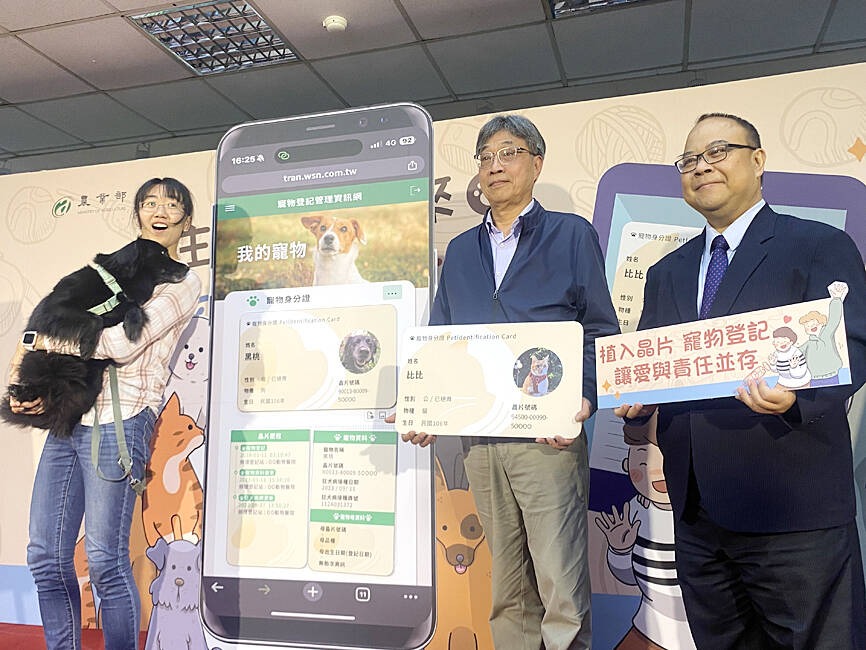The Ministry of Agriculture has launched a digital pet identification system to improve animal welfare, and root out illegal breeding and smuggling.
The new digital identification (ID) cards would contain more information than previous ID documents, for example, a photograph of the pet, Animal Welfare Department Director Chiang Wen-chuan (江文全) told a news conference yesterday.
The ID cards would also include the pet’s birth date, the name of the owner, and whether the animal has been sterilized and vaccinated.

Photo: CNA
The online system was launched for convenience and because not enough information was included on the previous ID document, Chiang said.
Pet owners would now be able to view and update all information relating to their animal on the Pet Registration Information System (https://www.pet.gov.tw/).
Previously, owners were only issued paper documents, which they had to update in person at registration agencies.
Chiang said he hopes the new pet ID system would help clamp down on illegal breeding and animal smuggling, and give prospective pet owners information about the mother of the pet they are considering purchasing or adopting.
Potential pet owners would also be able alert to animal welfare agencies if they find anything suspicious, for example, if breeders fail to provide information about how the pet was bred, Chiang said.
Only dogs are required to be registered under the Animal Protection Act (動物保護法), but it is likely to become mandatory for cats, too, Chiang said.
Acting Minister of Agriculture Chen Junne-jih (陳駿季) said digital pet IDs help to trace where animals have come from and would help monitor breeding facilities.
Other policies would be proposed to encourage people to register their pets, for example, providing a discount on vaccines after registration, he added.

The first global hotel Keys Selection by the Michelin Guide includes four hotels in Taiwan, Michelin announced yesterday. All four received the “Michelin One Key,” indicating guests are to experience a “very special stay” at any of the locations as the establishments are “a true gem with personality. Service always goes the extra mile, and the hotel provides much more than others in its price range.” Of the four hotels, three are located in Taipei and one in Taichung. In Taipei, the One Key accolades were awarded to the Capella Taipei, Kimpton Da An Taipei and Mandarin Oriental Taipei. Capella Taipei was described by

The Taichung District Court yesterday confirmed its final ruling that the marriage between teenage heir Lai (賴) and a man surnamed Hsia (夏) was legally invalid, preventing Hsia from inheriting Lai’s NT$500 million (US$16.37 million) estate. The court confirmed that Hsia chose not to appeal the civil judgement after the court handed down its ruling in June, making the decision final. In the June ruling, the court said that Lai, 18, and Hsia, 26, showed “no mutual admiration before the marriage” and that their interactions were “distant and unfamiliar.” The judge concluded that the couple lacked the “true intention of

EVA Airways today confirmed the death of a flight attendant on Saturday upon their return to Taiwan and said an internal investigation has been launched, as criticism mounted over a social media post accusing the airline of failing to offer sufficient employee protections. According to the post, the flight attendant complained of feeling sick on board a flight, but was unable to take sick leave or access medical care. The crew member allegedly did not receive assistance from the chief purser, who failed to heed their requests for medical attention or call an ambulance once the flight landed, the post said. As sick

INDUSTRY: Beijing’s latest export measures go beyond targeting the US and would likely affect any country that uses Chinese rare earths or related tech, an academic said Taiwanese industries could face significant disruption from China’s newly tightened export controls on rare earth elements, as much of Taiwan’s supply indirectly depends on Chinese materials processed in Japan, a local expert said yesterday. Kristy Hsu (徐遵慈), director of the Taiwan ASEAN Studies Center at the Chung-Hua Institution for Economic Research, said that China’s latest export measures go far beyond targeting the US and would likely affect any country that uses Chinese rare earths or related technologies. With Japan and Southeast Asian countries among those expected to be hit, Taiwan could feel the impact through its reliance on Japanese-made semi-finished products and